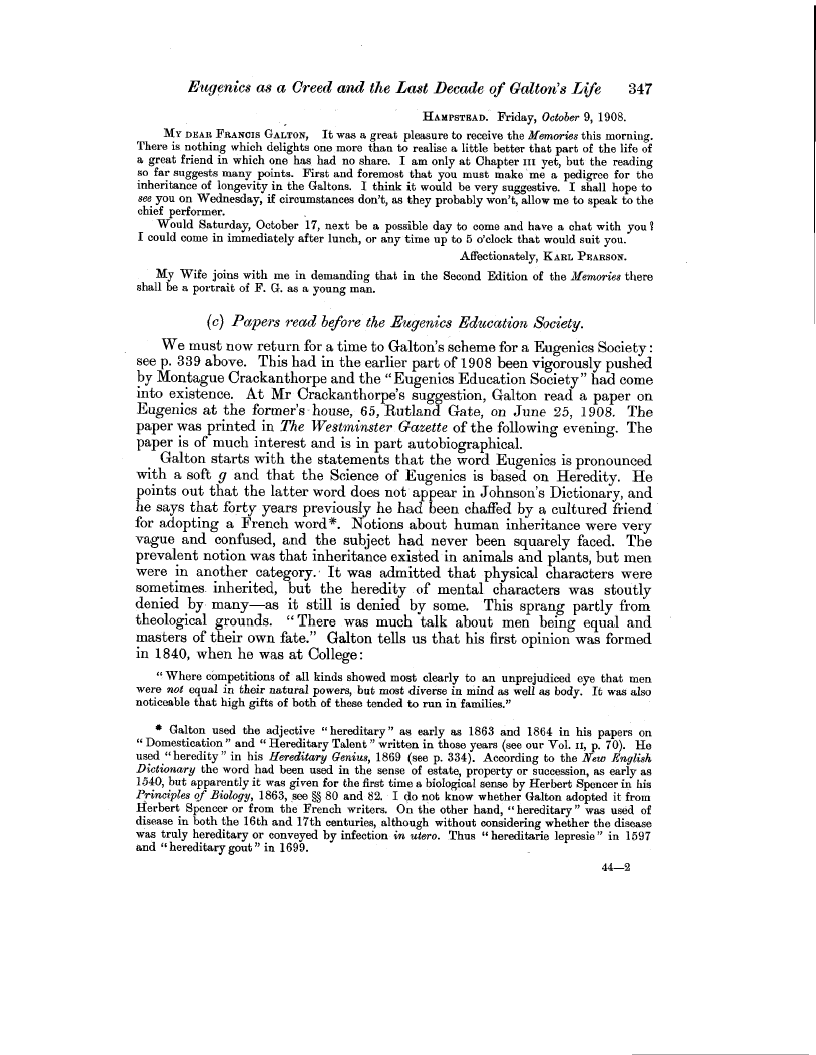| ||||||

OCR Rendition - approximate
Eugenics as a Creed and the Last Decade of Galton's Life 347 HAMPSTEAD. Friday, October 9, 1908. MY DEAR FRANCIS GALTON, It was a great pleasure to receive the Memories this morning. There is nothing which delights one more than to realise a little better that part of the life of a great friend in which one has had no share. I am only at Chapter in yet, but the reading so far suggests many points. First and foremost that you must make ' me a pedigree for the inheritance of longevity in the Galtons. I think it would be very suggestive. I shall hope to see you on Wednesday, if circumstances don't, as they probably won't, allow me to speak to the chief performer. Would Saturday, October 17, next be a possible day to come and have a chat with you 1 I could come in immediately after lunch, or any time up to 5 o'clock that would suit you. Affectionately, KARL PEARSON. My Wife joins with me in demanding that in the Second Edition of the Memories there shall be a portrait of F. G. as a young man. (c) Papers read before the Eugenics Education Society. We must now return for a time to Galton's scheme for a Eugenics Society see p. 339 above. This had in the earlier part of 1908 been vigorously pushed by Montague Crackanthorpe and the "Eugenics Education Society" had come into existence. At Mr Crackanthorpe's suggestion, Galton read a paper on Eugenics at the former's=house, 65, Rutland Gate, on June 25, 1908. The paper was printed in The Westminster Gazette of the following evening. The paper is of much interest and is in part autobiographical. Galton starts with the statements that the word Eugenics is pronounced with a soft g and that the Science of Eugenics is based on Heredity. He points out that the latter word does not appear in Johnson's Dictionary, and he says that forty years previously he had been chaffed by a cultured friend for adopting a French word*. Notions about human inheritance were very vague and confused, and the subject had never been squarely faced. The prevalent notion was that inheritance existed in animals and plants, but men were in another category., It was admitted that physical characters were sometimes. inherited, but the heredity of mental characters was stoutly denied by many-as it still is denied by some. This sprang partly from theological grounds. " There was much talk about men being equal and masters of their own fate." Galton tells us that his first opinion was formed in 1840, when he was at College "Where competitions of all kinds showed most clearly to an unprejudiced eye that men were not equal in their natural powers, but most diverse in mind as well as body. It was also noticeable that high gifts of both of these tended to run in families." * Galton used the adjective "hereditary" as early as 1863 and 1864 in his papers on " Domestication " and `1 Hereditary Talent " written in those years (see our Vol. II, p. 70). He used "heredity" in his Hereditary Genius, 1869 (see p. 334). According to the New English Dictionary the word had been used in the sense of estate, property or succession, as early as 1540, but apparently it was given for the first time a biological sense by Herbert Spencer in his Principles of Biology, 1863, see § 80 and 82. I do not know whether Galton adopted it from Herbert Spencer or from the French writers. On the other hand, "hereditary" was used of disease in both the 16th and 17th centuries, although without considering whether the disease was truly hereditary or conveyed by infection in utero. Thus "hereditarie lepresie" in 1597 and "hereditary gout" in 1699. 44-2
|